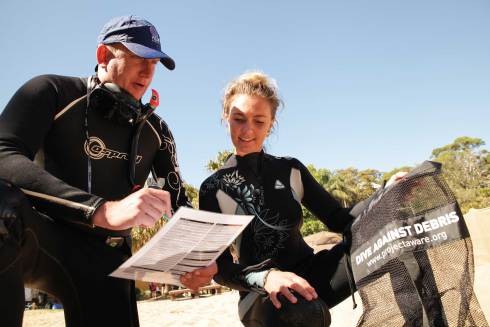Divers are our Top Citizen Scientists in the Marine Environment

Surfers, kayakers, fishers, boaties, swimmers and beach walkers are all passionate about the marine environment but divers are most likely to contribute to marine citizen science projects, according to a national survey by a Southern Cross University researcher.
Environmental social researcher Vicki Martin conducted the first national survey of people’s willingness to assist marine science in Australia, with 1145 marine users taking part. The information is essential for greater and more effective engagement of the public in marine research in the future.
The results, contained in the paper ‘Public Interest in Marine Citizen Science: Is there Potential for Growth?’, have been published in the journal BioScience.
“The marine environment is very important in the lives of the respondents. Overall, they strongly agreed the marine environment contributes to their ‘quality of life’ and wellbeing, and that they would personally be affected if the health of the marine environment declined,” said Ms Martin, a PhD candidate in the School of Environment, Science and Engineering.
“The majority of respondents indicated they were interested in assisting marine research; however the level of interest varied as did the number of hours people were willing to contribute.
“Divers expressed the strongest level of interest. Half of the divers were willing to volunteer at least once a month.”
Data collection – activities like recording sightings of marine species, monitoring coral growth, sending fish frames to scientists, logging fish catch data, or compiling lists of marine debris at a particular location - was the most preferred role in research across all groups. “After data collection, group differences became apparent,” said Ms Martin.
“Fishers preferred to help decide research topics, divers preferred to help analyse findings, and all other marine users preferred to help communicate findings.
“Taking people’s preferences into account is an important consideration for the development of future citizen science projects. There is no point designing projects that no one is interested in. The result shows clear preferences for the types of activities potential volunteers are willing to undertake.”
Overall, respondents below the age of 45 expressed a higher level of interest in citizen science.
“While the difference between the older and younger age groups was not great, this may be a reflection of the physically demanding nature of many marine activities. Having said that, I know plenty of keen marine citizen scientists over the age of 45,“ Ms Martin said.
There was a small, positive correlation between interest and education level. And respondents were more willing to share data with university-based researchers, followed by CSIRO; private research companies were least frequently mentioned. The survey was conducted February to April 2015.
Ms Martin’s paper was awarded ‘Editor’s Choice’, which means the article is open access (freely-accessible) on the BioScience website. Ms Martin was also invited to do a podcast interview with senior editor, James Verdier.
“It was very gratifying to have a publication accepted by such a highly-regarded journal in the biological sciences. Not only because the article presents results from my PhD research, but also because it is challenging for a social scientist to publish in this area,” said Ms Martin. x
“Being awarded ‘Editor’s Choice’ is a huge honour, and greater accessibility to the article will help to feedback the survey results to the community who so generously gave their time to respond, particularly since many groups do not have the funds to subscribe to academic journals. Considering the findings of the research could be useful to many citizen science groups around the globe, I was keen to make it as accessible as possible.”
Ms Martin has been invited to present the results of her research at a workshop on citizen science at the Coast to Coast Conference in Melbourne on August 20. Her attendance at the workshop has been sponsored by the Great Barrier Reef Citizen Science Alliance.
“The findings in my presentation provide valuable information about potential volunteers for marine citizen science groups around the country,” she said.



